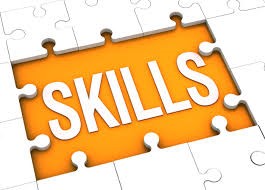
Major gifts work is often compared to selling. Selling is the exchange of money for property, goods or services, while major gift programs facilitate the exchange of money for the fulfillment of a donor’s interests and passions. If a MGO can successfully identify a donor’s interests and passions and match them to a program his organization is executing, then the money comes in naturally.
But back to the selling and skills…
I recently became aware of the writings of Dan Ross, Senior AVP of Commercial Sales at Salesforce, who wrote in their online newsletter Quotable, about sales skills that can and can’t be taught. I was intrigued by these lists and decided to share them with you in the same two parts Dan did: Part 1 – sales skills that can be taught and Part 2 – sales skills that can’t be taught.
And as I share them, in slightly edited form to accentuate the main point, I am going to relate each point to your work in major gifts.
Here’s the first part: the seven sales skills that can be taught.
1. PIPELINE GENERATION
The easiest way to generate a pipeline is to start with existing pipelines. Sales reps can be taught to be curious and to always ask if there is room to upsell or cross-sell beyond the initial solution being evaluated. Account reviews with existing customers can often identify additional business challenges customers didn’t even know your product could solve.
Major Gift Application: The experts in commercial sales say the same thing that Jeff and I say about building a caseload. You start with existing donors. The whole idea that ignoring current donors to chase “prospects who can give us a lot of money” is a waste of time and money. Look to build your caseload from current donors.
2. TIME MANAGEMENT
We train our reps to put time on their calendar to get organized. Spend 15 minutes at the end of the day planning what you will do tomorrow. Focus on revenue-generating activity, but don’t tip the scale too far towards your quota. You can’t afford to neglect accounts. You never know which account could be your next big deal. You also can’t neglect your own development. Make time for training, mentorship, and practice.
Major Gift Application: Time is the only thing you have to manage, which is why creating a plan for every donor and then managing that plan with discipline and focus is the only way to manage your caseload. Don’t think you can be successful just by being spontaneous. Make a plan for every donor and manage it. Just as Dan says, spend 15 minutes at the end of your day planning what you will do tomorrow.
3. BUSINESS ACUMEN
Business acumen is a term that gets used in many ways. I love when sales professionals have the business acumen needed to understand all lines of business within their customer’s organization, understand the biggest challenges and priorities, and speak executive language.
Major Gift Application: Very clearly understanding the donor’s passions and interests and how they integrate with what your organization is doing – this is the key to major gift success. When you understand what your donors care about, you can understand their concerns, the hopes and dreams they have and how they want to use their power (money, time, influence) to do good and change the world. Once you have all of this down, you can speak their language and relate better.
4. SALES ACUMEN
Sales is a process. To be great you need to master each step, otherwise your efforts will not lead to results. The steps of our process typically begin with prospecting, followed by discovery to better understand the prospect’s needs. This serves as proof that you can solve their challenges, negotiation, and implementation.
Major Gift Application: Note the words Dan uses above: “discovery to understand the [donor’s] needs.” You must discover the donor’s needs. And once you have, you can then integrate your organization’s needs with your donor’s needs. This is the one critical thing that you must do with every donor on your caseload.
5. BIG DEALS
Larger, more complex sales cycles require additional sales skills that go beyond general sales acumen. These evaluations require more creativity and organization. There will be far more people involved, so you will need to triangulate the relationships within your account and maintain multiple relationships, gathering feedback, and uncovering objections along the way.
Major Gift Application: If you have followed Jeff’s and my writings over the years you will remember that we always say “look for the 2 or 3 donors in your caseload that, if you did everything right, could give a transformational gift.” This is true. We have experienced it hundreds of times, where a $5,000 donor gives $4 million, a $10,000 donor gives $2 million, a $1,000 donor gives $8 million, etc. But these are more complex “deals.” They really are. Which is why you need to involve others to help you do it – program, finance, the CEO, etc. And it takes more time not only in terms of how long it takes, but also in how much time it costs you to do the work. This is a reality. Find those few donors who can do something transformational in their areas of interest. And start to work your plan to make it happen.
6. PRODUCT KNOWLEDGE
If you play a musical instrument, you might appreciate how hard it is to write a song that includes chords you can’t play. If you do not understand the value of each of your products, it is very difficult to sell the value of the product, and you will definitely miss out on opportunities within your territory. Know the value proposition, the competitors, common objections, and ideally how to get hands-on with the solution to do your own demos.
Major Gift Application: Program knowledge. This is huge. You can’t sell what you don’t know. Jeff and I are constantly amazed at how many MGOs do not know or do not understand the programs of their organization. This is why we regularly tell you that you must, at least once a week, get in touch with what your organization is doing. Sit with program people. Visit the programs. Jump in and see it, feel it and understand it. Then, work to grasp how your nonprofit’s work stacks up against what other organizations are doing in the same area. Create a list of common objections and how you will answer them. If you don’t know something, ask. Be curious and find out. Understanding your program offers is key to your success as a MGO.
7. FORECASTING
Forecasting is all about making smart decisions for your business. Based on the pipeline you can see and the pipeline you can source, are you on track for your goals? If not, what do you need to do differently? The best sales professionals know how to use their forecast to prioritize their time, to ask for help where needed, and when to walk away from a deal. They use CRM to keep their pipeline in real time, all the time, so that the data give consistent information for others in their organization to also make smarter decisions.
Major Gift Application: You must constantly be in touch with how your caseload donors are performing. And if you have the software systems in place, you need to do it in real time, so that you can change the plan you have for the donor if new information shows up. If you set a financial goal for your donor, as we suggest you should, and you cash-flowed that goal, then you can know, in real time, if the donor is “behind” in her giving. And if she is, you can do something about it. The point here is to be in touch, on a daily basis, with how the donors on your caseload are performing. In addition to managing your caseload better, the advantage of this approach is that you will also be able to forecast future giving better.
So these are the seven skills that can be taught. If you find that you are a little weak in any area, start reading about it, find training to increase your knowledge, and also find someone who can be your mentor in that area. These are things that you can do if you put your mind to it.
My next blog will cover the seven skills that can’t be taught. You will find the list interesting and helpful. Helpful because if you find yourself lacking in one of the skills, I do believe you can make progress in developing it. And if you can’t, it will be helpful in informing you of your future career directions and choices.
Richard
Search Blog Posts

7 Sales Skills That Can and Can’t Be Taught – Part 1
1 Comment
Trackbacks/Pingbacks
- 7 Sales Skills That Can’t Be Taught – Part 2 — Veritus Group, LLC - […] Part 1 of this two part series, I wrote that major gifts is often compared to selling. Selling is…





Would like to read the next blog…about the seven skills that CAN’T be taught.where can I find that and how do I access it?